On the ‘doxxing’ of J.K. Rowling
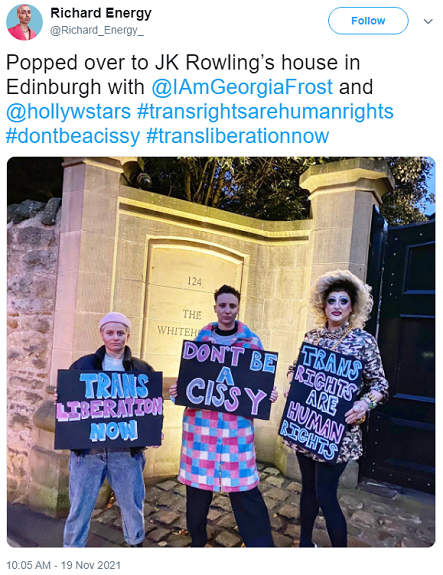 Last Friday comedian Holly Stars, actor Georgia Frost and drag king Richard Energy staged a small-scale demonstration outside the Edinburgh house of Harry Potter author J.K. Rowling, holding signs that read “Trans Liberation Now”, “Don’t Be a Cissy” and “Trans Rights are Human Rights”. Richard Energy tweeted a photo of their protest, which was intended as a statement against Rowling’s notorious “gender critical” views.
Last Friday comedian Holly Stars, actor Georgia Frost and drag king Richard Energy staged a small-scale demonstration outside the Edinburgh house of Harry Potter author J.K. Rowling, holding signs that read “Trans Liberation Now”, “Don’t Be a Cissy” and “Trans Rights are Human Rights”. Richard Energy tweeted a photo of their protest, which was intended as a statement against Rowling’s notorious “gender critical” views.
No disrespect to the three individuals involved, but they are not exactly household names, and their protest would have attracted little media attention if it hadn’t been for Rowling’s ludicrously over-the-top reaction. On Monday morning she published an angry Twitter thread in which she attacked the three for having “doxxed” her by publishing a photo that revealed her home address. She accused them of putting herself and her family in danger and issued the dramatic plea: “I implore those people who retweeted the image with the address still visible, even if they did so in condemnation of these people’s actions, to delete it.”
Rowling denounced the protest as an attempt to “intimidate me out of speaking up for women’s sex-based rights” and, striking a heroic pose, declared that she had “received so many death threats I could paper the house with them, and I haven’t stopped speaking out”. She lectured the protesters that “the best way to prove your movement isn’t a threat to women, is to stop stalking, harassing and threatening us”.
Needless to say, the mainstream media weighed in with uncritical coverage of Rowling’s accusations against the “trans activists” (none of whom would appear to be transgender, by the way). Typical headlines read: “JK Rowling blasts three trans activists for trying to ‘intimidate’ her with Twitter picture outside her home showing her address” (Daily Mail); “JK Rowling refuses to be intimidated after trans-rights activists reveal her home address” (The Scotsman); “I’ve had enough death threats to paper my home, says JK Rowling, after trans activists reveal her address” (Daily Telegraph); “TROLL HATE JK Rowling vows not to be silenced by trans activists after ‘enough death threats to paper the house’” (The Sun).
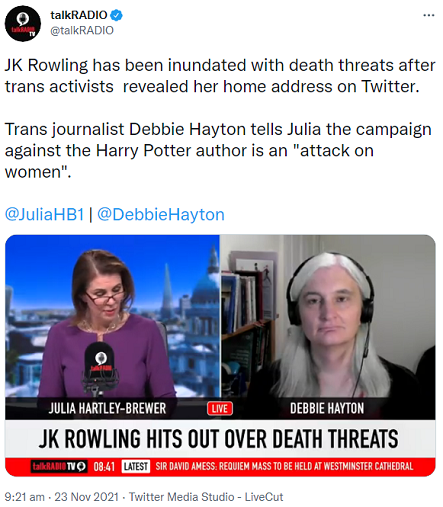 You’ll note that that the headlines in Telegraph and The Sun were, probably intentionally, ambiguous and could be taken to mean that the death threats were caused by the protest, which even Rowling herself didn’t claim. This was at least better than talkRADIO, which dispensed with the ambiguity and fed its audience the straightforward lie that “JK Rowling has been inundated with death threats after trans activists revealed her home address on Twitter”.
You’ll note that that the headlines in Telegraph and The Sun were, probably intentionally, ambiguous and could be taken to mean that the death threats were caused by the protest, which even Rowling herself didn’t claim. This was at least better than talkRADIO, which dispensed with the ambiguity and fed its audience the straightforward lie that “JK Rowling has been inundated with death threats after trans activists revealed her home address on Twitter”.
So, according to Rowling and her media allies, publishing a Twitter photo of a brief, one-off and entirely peaceful demonstration against her position on trans rights amounted to intimidating, stalking, harassing and threatening her.
Rowling even reported Stars, Frost and Energy to the police, who presumably informed her politely that no criminal offence had been committed, while privately rolling their eyes at the arrogance and sense of entitlement induced by celebrity status. Evening Standard columnist Ayesha Hazarika, who depicts the protesters as thugs guilty of “terrorising” Rowling, says that she “quite rightly” called in the cops. Personally I think Rowling should have been charged with wasting police time.
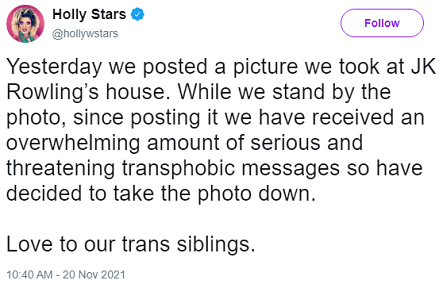 Furthermore, by the time she launched her Twitter attack on the three protesters they had already taken down the photo to which she so vehemently objected, after receiving what Holly Stars described as “an overwhelming amount of serious and threatening transphobic messages”. As you might expect, neither Rowling nor her supporters saw the need to condemn those messages.
Furthermore, by the time she launched her Twitter attack on the three protesters they had already taken down the photo to which she so vehemently objected, after receiving what Holly Stars described as “an overwhelming amount of serious and threatening transphobic messages”. As you might expect, neither Rowling nor her supporters saw the need to condemn those messages.
Not content with whipping up outrage over a photo that had been deleted two days earlier, Rowling also decided to tag Stars, Frost and Energy in her Twitter thread, which had the predictable effect of provoking a pile-on from her nearly 14 million followers, with the result that all three have been forced to deactivate their social media accounts.
This is how the culture war is waged. Privileged individuals cast themselves as victims who are courageously resisting attempts to silence them, while mobilising their own considerable media power to smear and suppress their relatively powerless critics, who in this fantasy scenario are accorded the role of oppressors.
As for the accusation of doxxing, Rowling’s Twitter critics immediately pointed out that the location of her Edinburgh home was hardly a secret. In recent years there has been an ongoing controversy, which has received extensive media coverage, over a fast-growing 30-foot high Leylandii hedge that Rowling has cultivated around her property, encroaching onto the adjacent main road and blocking street lights. In 2015 the lives of local people were disrupted for several days when the road had to be partially closed while gardeners used cherry pickers to trim the out-of-control Leylandii.
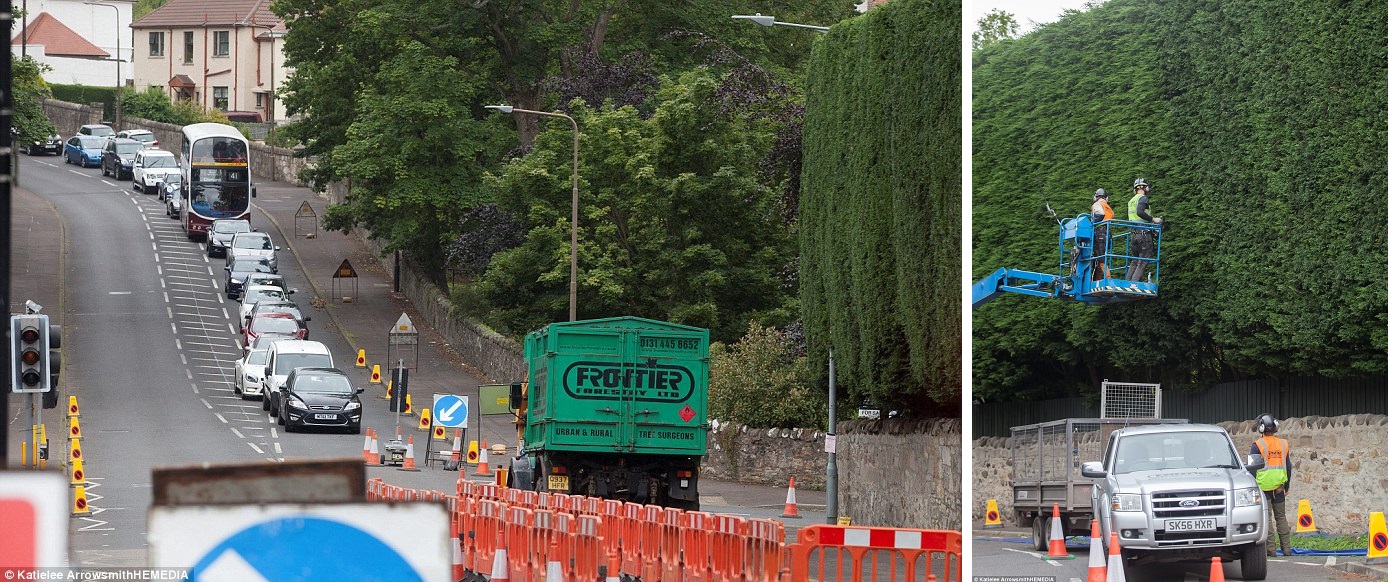
The Daily Mail explained that the purpose of Rowling’s giant hedge was to “stop Harry Potter superfans peering into her home”, noting that “the author’s mansion is on the tourist trail for Potter fans, with many posting pictures of themselves outside the walls on social media”. (See here for an example.) I can find no evidence that Rowling has ever tried to dissuade her fans from doing that, even though according to her current logic they must have been putting her family’s lives at risk by publicising her address.
The tourist information website All About Edinburgh even listed Rowling’s mansion as one of the sights to see in the Barnton area of the city. (“The writer of Harry Potter J.K Rowling lives in a house that would not be out of place if in an episode of Harry Potter.”) Although the entry has now been deleted after the furore she created over the protest, there’s no indication that it had previously met with any objection from Rowling.
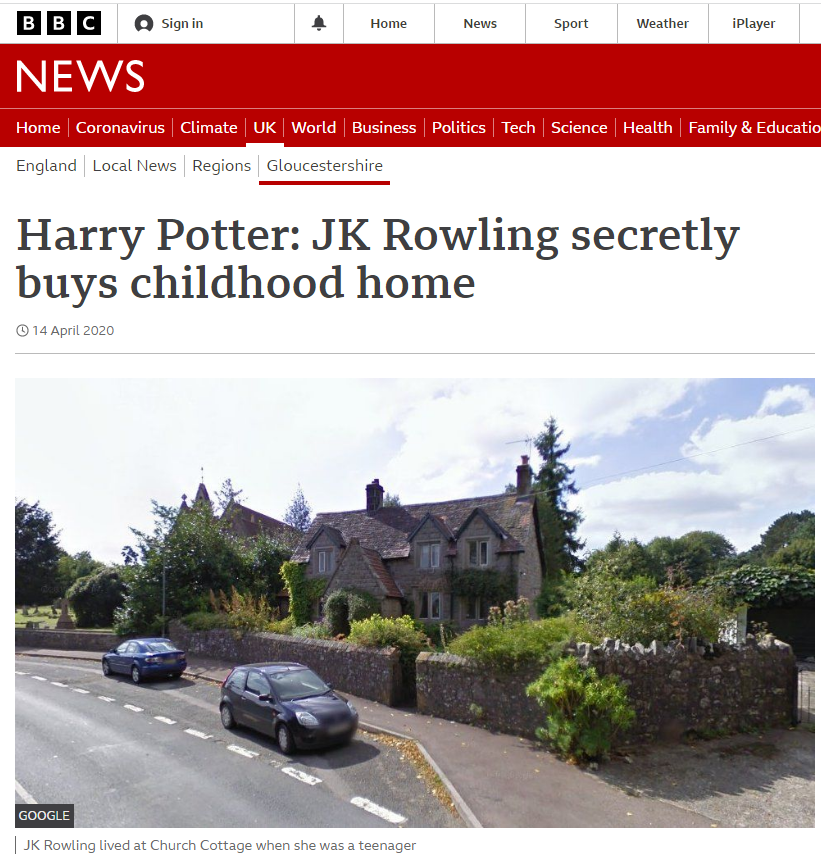 What with her being #196 on the Sunday Times rich list with an estimated net worth of £820 million and all, it’s hardly surprising that the Edinburgh property isn’t Rowling’s only palatial residence in Scotland. She also owns the Killiechassie country estate and house in Perthshire. It has its own Wikipedia page, which tells us that Rowling purchased the estate in 2001 and provides a photo of the house together with a map. Last year the BBC reported that Rowling had also bought her childhood home in Gloucestershire, and gave full details. Again, there’s no sign that Rowling objected to any of this information being made public.
What with her being #196 on the Sunday Times rich list with an estimated net worth of £820 million and all, it’s hardly surprising that the Edinburgh property isn’t Rowling’s only palatial residence in Scotland. She also owns the Killiechassie country estate and house in Perthshire. It has its own Wikipedia page, which tells us that Rowling purchased the estate in 2001 and provides a photo of the house together with a map. Last year the BBC reported that Rowling had also bought her childhood home in Gloucestershire, and gave full details. Again, there’s no sign that Rowling objected to any of this information being made public.
So Rowling’s complaint that tweeting a photo of last Friday’s protest amounted to doxxing because it showed her address is frankly laughable. Doxxing is defined as “the act of publicly revealing previously private personal information about an individual or organization, usually through the Internet”. You can’t doxx someone by revealing details about them that are already in the public domain and easily available to anyone capable of using google.
Numerous critics of Rowling took to Twitter to underline the absurdity of Rowling’s denunciation of the protesters, with jokes about doxxing Joe Biden by demonstrating outside the White House in Washington. Some took the opportunity to post her full address complete with postcode. The end result has been that while the location of Rowling’s Edinburgh residence was never difficult to identify, it is now a whole lot easier.
You could argue that this is an example of the Streisand effect, defined as “a phenomenon that occurs when an attempt to hide, remove, or censor information has the unintended consequence of increasing awareness of that information, often via the Internet”. It takes its name from US singer Barbra Streisand, who in 2003 unsuccessfully sued a photographer for breach of privacy after he published an aerial shot of her clifftop mansion in Malibu as part of a project documenting the erosion of the California coastline. The attendant publicity had the effect of greatly increasing the number of people who knew the details of where Streisand lived.
However, unless Rowling is completely naive, she must have known this would be the inevitable result of her hyping up the protest in the way she did. If she genuinely believed that the public availability of her Edinburgh address posed a threat to the safety of herself and her family, then why would she adopt a course of action that could only increase the threat? Is she really that stupid and irresponsible? If, on the other hand, her aim was to engage in a self-dramatising display of indignation for the media, in order to win sympathy for her “gender critical” ideology and portray trans-rights activists as the instigators of intimidation and violence, this was was certainly an effective way to go about achieving that.
First published on Medium in November 2021